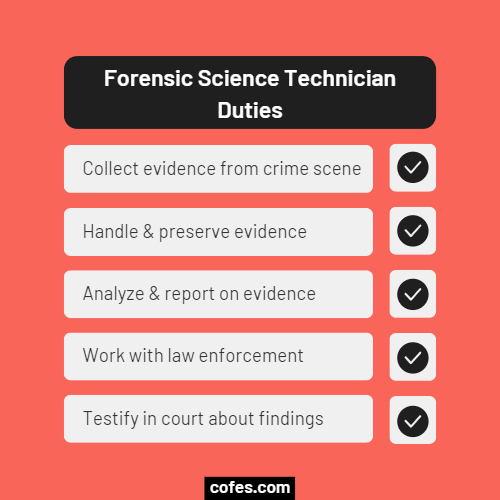If you have ever seen an episode of a crime show, you might already be familiar with the forensic science technician’s role in a criminal investigation.
They are a critical component of the crime-solving process, and without their expertise in collecting and analyzing evidence, our society would be lost to criminals.
The responsibilities of forensic science technicians can vary depending on their specialty, but the value of their work is universal.
Forensic Science Technician Job Information
| Official Job Title | Forensic Science Technician |
| Average Salary | $61,930 |
| Stress Level | Above Average |
| Work/ Life | Low |
| Job Satisfaction | High |
| Career Advancement | Above Average |
Forensic Science Technician Job Description
What Is A Forensic Science Technician?
Forensic science technicians is a broad term, but they usually are responsible for analyzing evidence to aid law enforcement and criminal investigators.
As a forensic science technician, handling the physical evidence found at a crime scene will require collecting and assessing anything from fingerprints to bullet fragments.
Using a series of tests and summarizations, the results that a forensic science technician determines are crucial parts of the criminal investigation process.
What Does A Forensic Science Technician Do On A Daily Basis?
The day-to-day responsibilities of forensic science technicians will vary depending on what they specialize in and the investigations they are aiding.
A forensic science technician’s tasks include laboratory work, collecting evidence from a crime scene, and even consulting or testifying in court.

Responsibilities, Duties & Roles Of A Forensic Science Technician
- Examining crime scenes to collect the proper evidence and record the necessary observations
- Handling, cataloging, and preserving evidence
- Performing a range of analyses
- Collaborating with law enforcement and investigators
- Reporting findings
- Testifying in court
- Consulting with specialists to conduct more extensive analyses
Forensic Science Technician Salary
Average Salary
According to the U.S. Bureau of Labor Statistics, the median annual wage for forensic science technicians was $61,930 in 2021.
The average salary for this profession ranges between $45,750 and $80,670 a year.
Starting Salary
The average salary for an entry-level position as a forensic science technician is $49,657 a year.
Senior Salary
An experienced forensic science technician with 10-19 years on the job has an average yearly salary of $67,211.
How To Become A Forensic Science Technician
The Entry Level: Certification, Training & Degree
A bachelor’s degree in forensic science, biology, or a similar field of study is required to become a forensic science technician.
It is common for forensic science technicians to have a bachelor’s degree in natural science (chemistry, biology, etc.) and a graduate degree in forensic science.
On-the-job training is most common and will provide all the necessary preparations for independent work as a forensic science technician.
Many different certifications are available to help aid in the professional development in this occupation, as well.
Overall, the level of education and certification required will vary depending on the field you are working in.
Other Skill Sets, Requirements & Qualifications
- Attention to detail:
- As a forensic science technician, the ability to notice minute details of crime scenes and physical evidence is crucial.
- Additionally, obtaining, classifying, and analyzing evidence requires a detail-orientated mind.
- Math and science skills:
- The varying analyses and conclusions that need to be determined as a forensic science technician entail a depth of knowledge in scientific and mathematical practices.
- Critical thinking and problem-solving:
- A large part of forensic science is inferring conclusions from unrelated evidence.
- Being able to ask the right questions and solve problems that do not have apparent solutions is a necessary aspect of this occupation.
- Communication skills:
- To share their conclusions, forensic science technicians must be able to explain them both orally and verbally.
- Forensic science technicians often communicate their findings, whether testifying in court or collaborating with colleagues.
How Long Does It Take To Become A Forensic Science Technician?
Usually becoming a forensic science technician usually takes 4-6 years, depending on your level of education.
A master’s degree can take up to 8 years.
Is It Hard To Become A Forensic Science Technician?
The field of forensic science is very competitive, but earning a master’s degree and obtaining certifications can help you stand out and better your chances of advancement.

Forensic Science Technician Career Paths
The Forensic Science Technician Roadmap
- Earn a bachelor’s degree
- Complete on-the-job training
- Earn a master’s degree
- Obtain certification (optional)
Projections For Growth In Forensic Science Technician Jobs
According to the Bureau of Labor Statistics, employment of forensic science technicians is projected to grow 11 percent through 2031, much faster than the average of other occupations.
In Summary: Is Forensic Science Technician A Good Career?
The unpredictable hours and stressful responsibilities negatively impact the overall quality of a career as a forensic science technician.
However, the work done in this occupation is significant and, therefore, rather fulfilling to those who do it.
Working Conditions
Can A Forensic Science Technician Work Remotely From Home?
Due to the travel requirements and laboratory techniques needed to perform the work of a forensic science technician, remote work in the field is unlikely.
How Many Hours Does A Forensic Science Technician Work?
A forensic science technician typically works a 40-hour week, with overtime being common.
The time of day work is completed will vary greatly due to the nature of the crime scene investigation.
Can A Forensic Science Technician Work Part-Time?
While there are exceptions, there is usually no part-time position as a forensic science technician.
What Are The Average Vacation Days Of A Forensic Science Technician?
Most forensic science technicians receive standard benefits, including vacation days — the exact number will depend on the organization.
Alternative Careers & Similar Jobs to a Forensic Science Technician
- Dispatcher
- Private Investigator
- Medical Laboratory Technician
- Data Analyst
- Financial Analyst
- Research Assistant
- Medical Records Technician
- Cardiovascular Technologist
- Chemical Dependency Counselor Assistant
- Case Manager
Forensic Science Technician Resume Tips
- Avoid using any italics or uncommon/fancy graphics or fonts. The key to a resume for forensic science technicians is the experience and the qualifications, not the design.
- Be sure to include both field and lab work when listing skills on your resume.
- If you have a LinkedIn profile, match your resume to it
Forensic Science Technician Interview Questions
Q1: Can you tell me how you would deal with the distressing nature of the job?
Why it works: Asking this question during an interview will demonstrate how the candidate handles stress and whether or not they will be an appropriate fit for the job.
Q2: Tell me about your ability to work under pressure.
Why it works: The duties of a forensic science technician play a critical role in criminal investigation; this question will help assess the applicant’s ability to handle the job.
Jobs Related To Forensic Science Technician
- Police identification and records officers
- Conservation scientists
- Criminal investigators
- Clinical laboratory technologist
For HR Managers: Tips For Hiring A Forensic Science Technician
Key Characteristics To Look For In A Forensic Science Technician
- Passion for accuracy and efficiency
- Expertise and knowledge in the field
- Ability to maintain classified information
- Calm demeanor
- Analytical mind
Minimum Level Of Education & Experience
The minimum level of education required for a forensic science technician is a bachelor’s degree in a related field.
However, a master’s degree or many certifications will help demonstrate the amount of knowledge a candidate has in the material.
